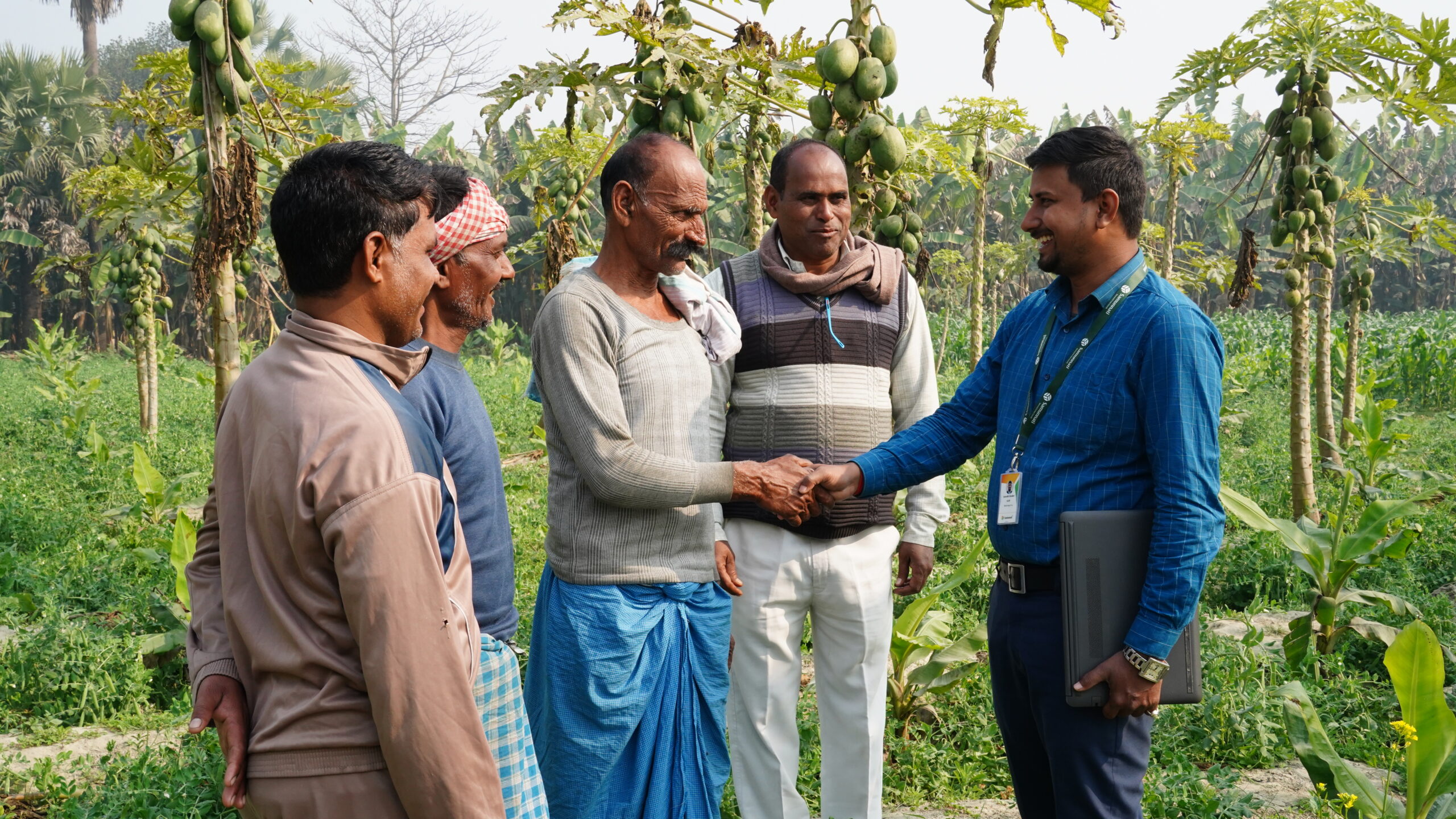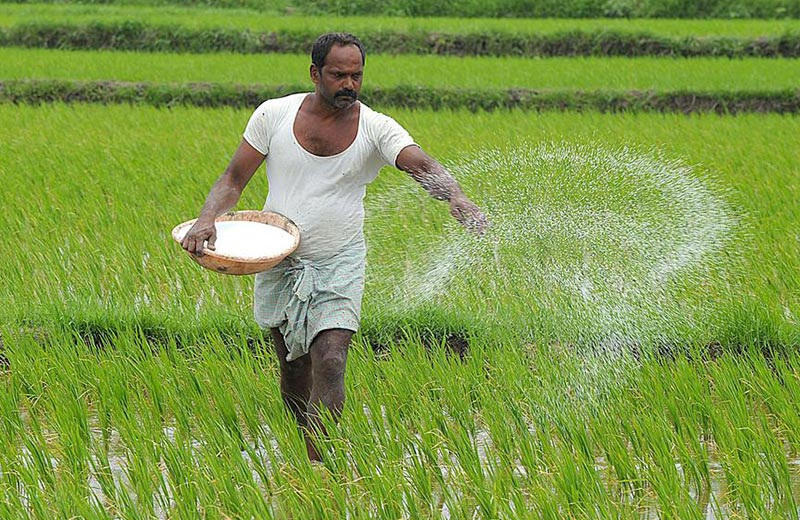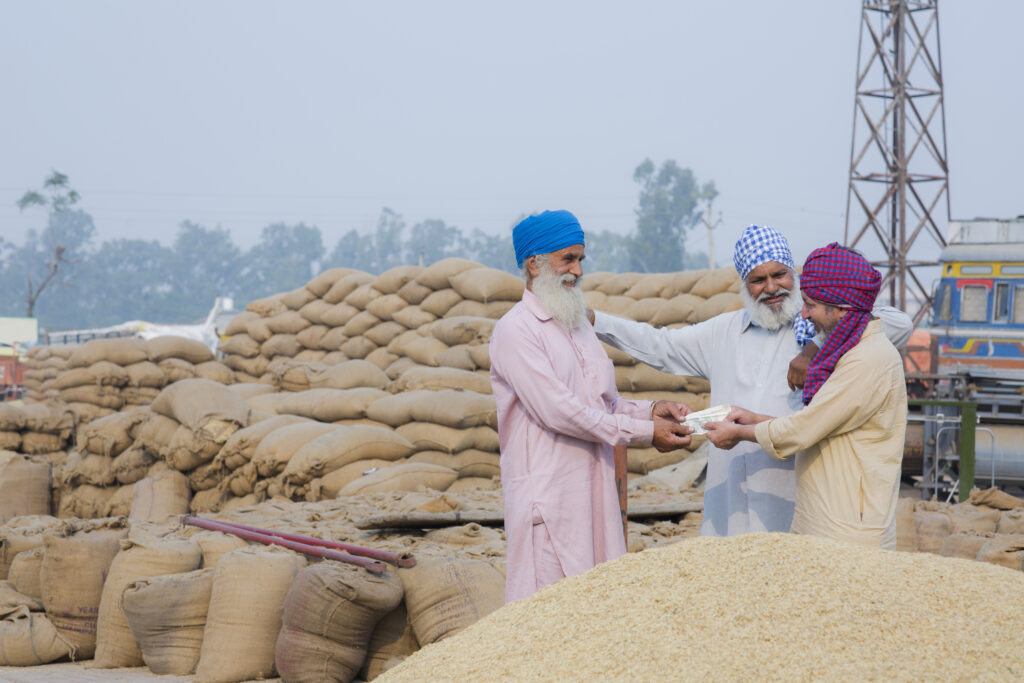Throughout India’s vast agricultural landscape, a quiet revolution is unfolding. Driven by a spirit of collective action and empowered by the convergence of various government schemes, Farmer Producer Organizations (FPOs) are transforming the lives of millions of farmers. These dynamic entities, formed by small and marginal farmers, are tackling the age-old challenges of fragmentation, lack of market access, and inadequate resources.
In the past, individual farmers often faced an uphill battle. Fragmented landholdings limited their bargaining power and access to resources, while exploitative middlemen and opaque market structures kept prices low. However, the emergence of FPOs has ushered in a new era of hope and empowerment. By pooling their resources, knowledge, and negotiating power, farmers are now able to access markets more effectively, secure better prices, and invest in technology and infrastructure.
This transformative journey has been fueled by a confluence of government initiatives, each designed to address specific challenges faced by FPOs. The impact of this convergence has been profound. The number of registered FPOs has witnessed an exponential rise, with farmers experiencing a significant improvement in market access, income, and bargaining power. Moreover, the adoption of technology and best practices has led to increased productivity, reduced post-harvest losses, and improved quality management.
This article delves deeper into the convergence of schemes, exploring their impact on the evolution of FPOs and highlighting the challenges and opportunities that lie ahead. By understanding the past, present, and future of these dynamic organisations, we can chart a course towards a more equitable and prosperous agricultural future for India.
- Central Sector Scheme for Formation and Promotion of 10,000 FPOs:
The imperative behind this initiative arises from the presence of fragmented landholdings and the absence of collective bargaining power among individual farmers. Additionally, there is a notable deficiency in access to markets, inputs, and technology, accompanied by challenges in attracting investments and scaling up operations.
Launched in 2020, the scheme endeavours to address these complexities by fostering an environment conducive to the formation and expansion of Farmer Producer Organizations (FPOs). Prime Minister Narendra Modi emphasised the transformative potential of the 10,000 FPOs scheme in augmenting Indian agriculture. Through the empowerment of farmers via collective action, enhanced access to markets, inputs, and technology is envisioned, leading to heightened income and improved livelihoods. As of June 2023, the scheme has surpassed its target, with over 10,000 FPOs registered. This underscores the considerable enthusiasm among farmers for engaging in collective action.
In Nashik, Maharashtra, the KRIBHCO Krushak Seva Kendra operates under the Central Sector Scheme for FPOs. Small and marginal farmers faced challenges in accessing quality inputs, fair prices, and market opportunities. The scheme has resulted in notable impacts, including increased access to high-quality seeds, fertilisers, and pesticides at affordable prices. Collective marketing and negotiation efforts have improved market access, leading to a 20% increase in farmers’ income.
- NABARD Support for FPOs:
FPOs often encounter challenges in securing credit due to limited collateral and a lack of financial track record. There is also a recognized need for technical assistance in areas such as market access, capacity building, and technology adoption.NABARD plays a pivotal role in providing financial and technical assistance to FPOs through various schemes.
In Maharashtra, Sahyadri Farms, with NABARD’s support successfully addressed challenges faced by pineapple farmers. The scheme facilitated collective marketing and processing, resulting in a 50% increase in farmers’ income, improved market access, and brand recognition.
Chairman of NABARD, G.R. Chintala, affirms NABARD’s commitment to the development of FPOs in India. The institution offers a spectrum of financial and non-financial services to assist FPOs in overcoming operational challenges.NABARD has disbursed financial assistance exceeding Rs. 2500 crore to FPOs over the past three years, enabling them to enhance infrastructure, invest in technology, and expand operations.
- SFAC Equity Grant and Credit Guarantee Fund Scheme:
FPOs necessitate capital for infrastructure development and capacity-building activities. There is also a need for financial instruments to mitigate risk and attract investments. SFAC addresses these needs by providing equity grants and credit facilities to FPOs.
The Managing Director of SFAC underscores the significance of the scheme in offering crucial financial support to FPOs during their initial stages. This support aids in overcoming capital constraints and building a robust foundation for future growth. SFAC has disbursed equity grants totaling over Rs. 150 crore to more than 2,000 FPOs, facilitating investments in infrastructure and organisational capacity.
In Gujarat, Pani Panchayat, operating under the SFAC scheme, addressed water scarcity challenges through the implementation of water-saving irrigation technologies. The impact includes a 40% increase in water use efficiency, improved soil health, and a 30% increase in crop yields.
- Integrated Scheme for Agricultural Marketing (ISAM):
FPOs require access to efficient marketing infrastructure to enhance market access and bargaining power. Additionally, support in adopting modern marketing practices and technologies is imperative. ISAM provides financial assistance for infrastructure development, training, and capacity building of FPOs in the marketing domain.
The Minister of Agriculture and Farmers Welfare acknowledges the positive impact of the ISAM scheme, noting its contribution to enhancing marketing skills and market access for FPOs, resulting in increased income for farmers and reduced post-harvest losses. Under ISAM, more than 1000 market yards have been upgraded, and over 2000 FPOs have received training in marketing skills, leading to improved market access and price realisation for farmers.
Under the ISAM, milk unions in Gujarat successfully addressed the longstanding issue of dairy farmers facing exploitation by middlemen and receiving unfair prices for their milk. Through the ISAM scheme, these milk unions achieved collective bargaining power, enabling them to negotiate better prices for their milk. This transformative initiative also facilitated the establishment of modern processing facilities, contributing to improved value addition and product quality.
- e-NAM:
The e-NAM platform serves as a national online trading platform for agricultural produce, addressing the need for transparent and efficient online markets. Since its inception, e-NAM has facilitated online trade worth over Rs. 1 lakh crore and garnered registrations from over 1.6 crore farmers and 18,000 FPOs. Adoni FPO in Andhra Pradesh experienced enhanced market access and price realisation since joining e-NAM in 2016. The FPO now receives 10-15% higher prices compared to local mandis, expanding its market reach and enabling collective marketing for better deals with buyers.
The transparent nature of e-NAM has eliminated the risk of fraud and manipulation, ensuring fair prices for farmers. The platform provides real-time market information, aiding FPOs in making informed decisions about pricing and market trends. Additionally, e-NAM has facilitated collective marketing for Adoni FPO, allowing them to aggregate their produce and negotiate better deals with buyers, leading to a substantial boost in farmers’ income.
In the ongoing pursuit of fortifying the FPO movement in India, it is imperative to recognize the evolving landscape of agricultural practices and the challenges faced by farmers. While commendable strides have been made through existing government schemes, an acute awareness of the dynamic agricultural environment underscores the necessity for additional measures.
Let’s explore key areas where there is a compelling need for governmental intervention and policy enhancements to further uplift and empower FPOs.
- Strengthening Regulatory Framework:
There is a pressing need to reassess and streamline the FPO registration process, rendering it more efficient and accessible. Concurrently, the formulation of a standardised model for FPO bylaws is crucial for widespread adoption. Legal and regulatory support must be extended to fortify FPOs, safeguarding their interests and fostering equitable competition.
In line with the focus/ policy framework of the Govt. of India, the State Governments may introduce an appropriate flexible policy to scale up FPO promotion and to strengthen them to become a self-sustaining commercially viable business enterprise of the farmers, particularly small producers.
Suitable amendments in the Producer Companies Act, 2013 may be introduced to make provision for private equity participation/ refundable long-term capital infusion by the private investors to strengthen the financials of FPOs and create a more sustainable business model for commercial sustainability. Also, Angel/ Venture capital support to FPOs along the lines of Startups may be extended.
- Capacity Building and Skill Development:
There is a compelling need to invest in comprehensive training initiatives encompassing financial management, marketing, technology adoption, and leadership skills for both FPO members and staff. Peer-learning opportunities, facilitated through workshops, seminars, and exchange visits, are essential. The establishment of dedicated extension services tailored to the unique needs of FPOs is imperative.
Private Institutions and Agricultural Universities may introduce special courses on FPO promotion and agribusiness management, with a focus on rural youths including women to create a large pool of professionals in rural areas for managing FPO activities. Further, the existing schemes like Agri clinics and Agribusiness Centre, may be redesigned to create professionals for not only promoting FPOs but also acting as CEO of the FPOs in their local areas.
- Promoting Value Chain Integration:
The government should actively assist FPOs in forging alliances with agribusiness entities, input suppliers, and stakeholders within the value chain. Support for establishing processing and storage facilities, enhancing produce value, and extending shelf life is critical. Facilitating financial access for FPOs to invest in value chain infrastructure and technology is imperative.
Suitable amendments in the APMC Act can be made to treat the country as a single, unified market for agri produce with no restrictions on commodity movement as well as to enable FPOs to market their produce directly to the consumers and bulk-buyers, without payment of mandi fee. Buyers may be encouraged to set up collection centres near farmers’ fields and production centres. Provision may also be made in the amended Act to provide direct market access to FPOs, treating the FPO as a place of Gramin Agri Market (GRAM) and building up of required marketing infrastructure to be owned and managed by FPO under the Govt. scheme.
- Facilitating Market Access:
There is an urgent need to encourage government procurement of agricultural produce directly from FPOs. Extending preferential market access to FPOs within established marketplaces, including mandis and supermarkets, is crucial. Support for FPO participation in trade fairs and exhibitions is essential to showcase their products and foster connections with potential buyers.
- Fostering Innovation and Technology Adoption:
The promotion of research and development initiatives focused on innovative technologies relevant to FPOs is vital. Financial incentives should be provided to encourage FPOs to adopt new technologies that enhance productivity and efficiency. Establishing a digital ecosystem facilitating FPOs’ access to information, resources, and market opportunities is an immediate requirement.
Convergence of resources for the creation of farm-level infrastructure at the FPO level for cleaning, grading, sorting, assaying, processing, branding & transportation of agri-commodities up to delivery and market centres as well as for the establishment of custom hiring centres for the benefit of shareholder members. Specific funds may be earmarked under the recent schemes of the Govt. of India for this purpose.
- Addressing Specific Challenges:
There is a critical need to develop targeted interventions to address challenges faced by women farmers, small and marginal farmers, and those from disadvantaged communities. Extending support for the adoption of climate-resilient agricultural practices within FPOs and facilitating access to insurance and other risk mitigation mechanisms are imperative.
The concerned Ministries and departments may be mandated to implement all Farmer-centric Schemes through the FPOs for efficient delivery of services and improved outcomes.
- Public Awareness and Advocacy:
Raising awareness among farmers and stakeholders regarding the benefits of FPOs is pivotal. Actively showcasing success stories to inspire and encourage the formation of FPOs is necessary. Advocating for policies fostering a robust FPO ecosystem in India is a collective responsibility to ensure the continued success of the FPO movement.
Since the FPO has been considered to be the way forward for enhancing farmers’ income and boosting agricultural growth, future strategies for scaling up FPO promotion by various stakeholders may focus on the following broad areas of critical support/ effective interventions; Mass awareness building Institution development Forging linkages with the ecosystem, and digital monitoring
By addressing these critical areas and fostering a collaborative environment, all stakeholders – government agencies, research institutions, private companies, NGOs, and farmers – can work together to build a thriving FPO ecosystem. This will not only empower farmers and transform their livelihoods but also contribute significantly to India’s agricultural growth and food security.
The future of FPOs in India holds immense promise. Embracing a collaborative approach, implementing effective solutions, and continuously adapting to the evolving needs of the agricultural sector will ensure that these dynamic organisations become the cornerstone of a prosperous and equitable agricultural landscape for generations to come.




